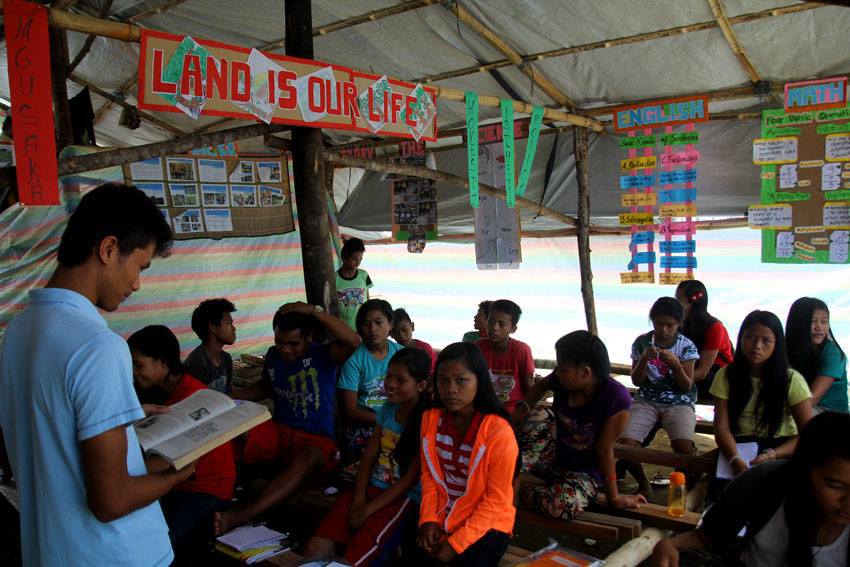FOR THE first time in Philippine history, a Mindanawon, Rodrigo Duterte, is set to become president after winning in the 2016 National Elections.
Expectations are high as he inherits a stalled peace deal between the government and the Moro Islamic Liberation Front (MILF). The proposed Bangsamoro Basic Law (BBL), which was supposed to legislate the Comprehensive Agreement on the Bangsamoro (CAB), failed to pass Congress after the Mamasapano incident in January 2015, a capture of wanted terrorists that cost at least 69 lives.
Several members of the MILF were implicated in the incident, raising doubt over their sincerity in peace talks. Popular support for the bill plummeted and legislators demanded a review of the BBL.
Besides its constitutionality, the inclusivity of the BBL has also been questioned. Among those left out are the Lumad, a collective name for Mindanao’s indigenous peoples (IPs).
While the Philippine Daily Inquirer reported that Duterte’s win gave the Lumad hope, he has been criticized for his connections with pastor Apollo Quiboloy and the New People’s Army, who have been affiliated with the displacement and killings of Lumad respectively. However, Duterte has listed addressing the Mindanao conflict as a top priority.
Federalism and continuity
For Duterte, federalism is the solution to the long-standing unrest. “Nothing short of a federal structure would give Mindanao peace,” he said at the proclamation of his candidacy. He previously declared support for the BBL but added that it should be more inclusive of parties such as the Moro National Liberation Front.
University of the Philippines’ Institute of Islamic Studies Dean Macrina Morados says federalism is a “good alternative” to the BBL. However, the system is not without critics, given the presence of political dynasties who may exploit such autonomy.
The new government may opt to continue peace talks under agreements signed by the previous administration and the MILF. However, sociologist Albert Alejo, SJ noted that there are legal challenges to the Framework Agreement on the Bangsamoro (FAB) and the CAB in the Supreme Court (SC).
“If the SC says it’s constitutional, then you have a good platform. If the SC says it is unconstitutional, then you start from zero. If… CAB is unconstitutional, but the FAB is constitutional, at least we have a framework,” Alejo said.
Moro and Lumad
Unclear provisions for resource distribution in contested territories with Lumad were also raised.
IPs are protected by the Indigenous People’s Rights Act of 1997 (IPRA), the International Labour Organization Convention 169, and the United Nations Declaration on the Rights of the Indigenous Peoples.
“Right from the start both the ARMM and the BBL… denied to recognize, protect and promote the inherent, inalienable and collective rights to land and self-determination of [IPs]… in spite of sustained appeals to participate in the peace process,” said Jimid Mansayagan, chairman of the Lumad Mindanaw Peoples’ Federation. “We only differ in method and approaches. They use armed struggle and strong political campaign in asserting their rights.”
Alejo proposed the transfer of provisions on IPs from the exclusive powers of the Bangsamoro government to concurrent powers with the national government. “We are not taking it away from the Bangsamoro, but we are not allowing the national government to relinquish its responsibilities to the indigenous peoples,” Alejo said.
For Morados, IPRA recognition in the BBL is already assumed as it is already its own law. However, she suggests an inclusion of undiscussed issues like resource sharing.
She also said that ancestral domains claimed by IPs will be respected, contrary to some impressions. “Kung ganoon ‘yung konteksto, mas lalong magulo. Mas lalong ma-digress at ma-dispossess ang IPs (If that were the context, it would be messier. The IPs would digress and be dispossessed),” she said, adding that IPs even had two seats in the Bangsamoro Assembly in the BBL. “I think it is the duty of theBangsamoro government to protect the property and life of the IPs.”
The way forward
“How do we move forward? Do we move backwards first?” asked Alejo, who noted that we took “one step backward, so we cannot go on with BBL, but we don’t probably have to start all over again because there’s a [CAB].”
In looking back, both Mansayagan and Morados share a myth. According to oral tradition, the Moro and the Lumad sprung from two brothers: Apù Tebunawey, who converted to Islam, and Apù Memelù, who kept his old religion.
“In the beginning their relationship was based on mutual respect and co-existence. But this dwindled to unequal relationship,” said Mansayagan, recounting Lumad slavery and raids by groups identified with Moros.
It seems that the way forward is to restore the lost relationship. However, Lumad and Moros view the same myth differently.
For the MILF, the BBL accommodates IPs because they are free to identify as Bangsamoro given their similar ancestral roots. The Lumad want to be recognized on their own terms.
“The non-recognition of our rights is unthinkable for us because… we believe that Lumad and our brother Moros share the same aspirations as peoples and as nations with rights to land and self-determination,” said Mansayagan.
In pursuit of peace, the next administration must reckon with these multiple narratives—or, the same narrative—and the multiple ways it is understood.




